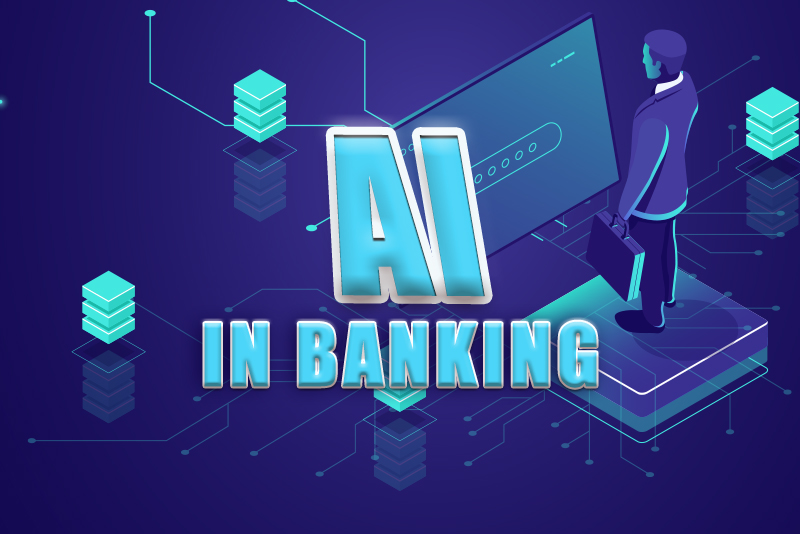The rapid evolution in technological advancements has made Artificial Intelligence (AI) a critical disruptor in almost every industry, including banking and finance. The banking industry is significantly incorporating artificial intelligence, robotics and other machine learning technologies into their operational workflows. In fact, the introduction of AI in banking apps and services has made the sector more customer-centric and technologically relevant. AI-based solutions or systems can help automate the arduous task of data discovery such as managing and reviewing financial documents. It can also help banks reduce costs, improve productivity, ensure complete confidentiality of client data, spot fraudulent information and make strategic financial decisions. The need for massive data storage management has led banking companies to hire data processing services, which help convert all critical documents into digital format and thereby ensure better operational efficiency.
According to a report by Business Insider, nearly 80 percent of banks are aware of the potential benefits that AI presents to their sector. It is estimated that by 2023, banks are projected to save $447 billion by using AI apps. These huge and changing figures indicate the significance of AI in the banking and finance sector and the role of AI in providing systematic compliance management and operations thereby improving efficiency, service, and productivity and reducing costs.
Understanding the Role of AI in Banking
AI in financial services and banking is not at all a new concept as it is already on its way to making financial institutions more accessible, efficient and secure. In order to leverage AI and deep learning in investment banking, financial institutions must continuously innovate to address the increased demand from modern tech-savvy clients and financial regulators. In fact, the technology is being used in the banking industry to scale new heights in customer relationship management. A significant part of the banking industry focuses on customer relationship management, which includes direct communication with the clients. This involves improving customer service through the use of virtual assistants or credit scoring to correctly determine a borrower’s risk.
Another potential of AI is related to cost savings. According to a study by Accenture, banks can leverage AI banking tools to increase their transactions by two and half times using the same headcount. Financial services companies are well equipped to take advantage of artificial intelligence. In fact, there is no AI in banking without data as banking institutions tend to collect or deal with a huge amount of data as part of their day-to-day financial operations. AI offers a platform for financial institutions to create a friendly customer experience, reduce error rates by employees, and make better investments. Intelligent Decision Management Systems (DMS) helps the institution remain compliant by reducing the error rates and time spent on capturing customer information accurately.
Top Benefits of Artificial Intelligence for Banks
Artificial Intelligence in finance enables banks to manage massive amounts of data at rapid speeds to gain a better understanding about their clients’ behaviors. With its ability to offer customized features and easy interactions, artificial intelligence in finance is now able to tailor financial goods and services, resulting in significant consumer engagement and the development of solid client relationships. Here are some of the top benefits of AI and machine learning in banks:
- Better Investment Evaluation – Interest earnings are one of the significant aspects of revenue generation for banks and financial institutions. Hence, they continually search for opportunities to invest and earn profitable returns. This is where the important role of AI comes into the picture. With the help of advanced AI-based investment software, banks can gain valuable investment recommendations that match their risk-taking capacity. Additionally, it can assist in correctly assessing customer funding proposals, given that industry-relevant data is often challenging to understand. This investment analysis software makes the process more unified there by allowing the decision-makers to accommodate more variables.
- Reduced Risks and Operational Costs – While customers tend to enjoy the human interaction when banking, it has a considerable drawback. Manual errors are inevitable, and these can sometimes have severe repercussions. Even when experienced employees are at the desk, there are possibilities that they can make manual mistakes that could expose the bank or financial institution to penalties and cause irreparable reputational harm. AI-based decision management systems can help lower this risk by making logic flows in data capture and incorporating predictive and prescriptive techniques to solve financial problems. For instance, by using DMS, banking professionals can set up rules that show the client what types of accounts they can open depending on their personal data or business information. If a client is opening an account online, age and source of income can determine the type of account available to them. Furthermore, with increased accuracy, the number of people the organization needs to assess for transactions and activities is further reduced. In addition, there is also a benefit related to employee wellness. For instance, a DMS reduces data entry time, meaning the team can spend more time innovating and focusing on core business tasks.
- Regulatory Compliance and Fraud Detection – Using a Decision Management System in banking helps for early fraud detection and comprehensive audit documentation. In fast-paced banking transactions, auditing exercises can be disruptive to regular operations when employees are called away from their desks to provide missing details or explain entries. With the right AI software and machine learning, information captured in the system will be accurate and errors will be immediately highlighted or disallowed. The technology analyzes large amounts of data and picks out suspicious transactions. Manually analyzing such transactions can lead to errors. With an AI fraud detection system in place, it is possible to track illegal and fraudulent activities.
- Improved Loan and Facility Evaluation – Analyzing credit scores to evaluate eligibility for financing often relies on outdated information, misclassification, and errors. An AI-based system can give approval or rejection recommendations by considering more variables even when the party, whether a person or a business, has little documentation.
- Enhanced Client Experience – Modern clients are on the constant lookout for ease and convenience, when it comes to banking transactions. For instance, with an ATM (Automated Teller Machine), clients can access integral assistance even when banks and financial institutions are closed. That level of comfort has only encouraged more innovation. Additionally, with the help of AI in financial services, customers can now open a bank account with their web or mobile devices right from the comfort of their homes. A decision management system (DMS) can reduce the time to capture Know Your Customer (KYC) information and eliminate errors. In addition, with appropriate business management software, financial decisions can be executed and rolled out without extensive procedures. DMS software can reduce approval times for facilities. At times, bank employees open accounts incorrectly, leading to restrictions placed on client accounts. Accurately capturing client information and correctly setting up client accounts ensures a smooth experience for the clients.
Artificial intelligence is changing the face of the financial and banking industry. AI in banks can deliver significant efficiency and cost-saving benefits. The technology provides banks a channel to identify suspicious activity quickly, make better investment decisions, and create a user-friendly experience for clients with its increased accessibility and flexibility. The technology allows people to make smarter business decisions and ultimately improve the bank’s competitiveness. Banking institutions can consider associating with a reliable business process outsourcing company to carry out various financial processes more quickly and efficiently.
The top applications of AI in banking and the core strategies that help incorporate AI in banking and financial sectors will be discussed in our next blog.
Avail the Services of Managed Outsource Solutions (MOS) to Improve Document Management Issues!
Get your Free Trial Today!




